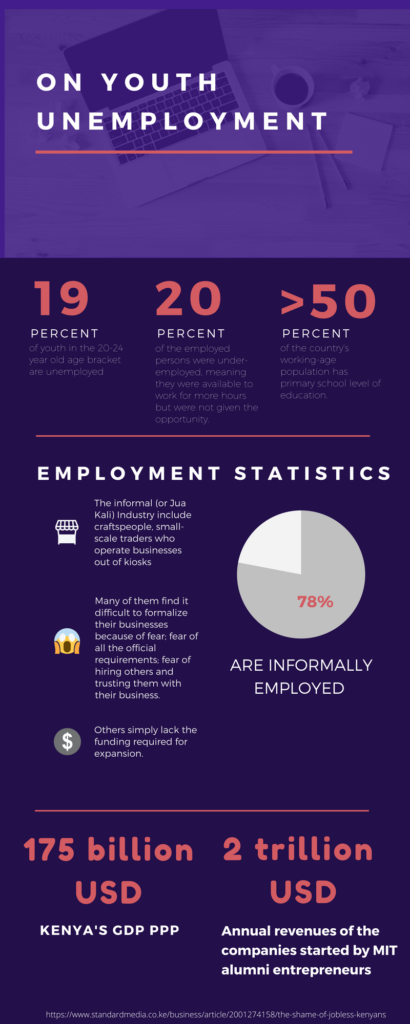When Kenya’s Big Four Agenda was announced, the thing that wasn’t explicitly mentioned was the Big One that would help drive – if not accelerate – all four, and that is harnessing human potential.
I’ve always been fascinated by the concept of human potential mostly because systems – education/work/culture – are designed to waste it. Human potential is wasted when people get hired based on who they know not what they know. It gets wasted when employees are forced to focus more on attendance and ‘sitting the time’ instead of actually producing results. It gets wasted when the educational system puts people on pre-determined paths that are incongruent with their interests and talents. It gets wasted when women and minorities face barriers to the workplace as a result of discrimination and social expectations.
When you look at Maslow’s hierarchy of needs, you find self-actualization – or the fulfillment of human potential – at the very top, making it more aspirational than realistic for most of us.
Recently, I attended a co-design workshop held at the Villa Rosa Kempinski that brought together people from industry, NGO’s and the Kenyan government to explore solutions for youth unemployment. Of course, whenever I attend such events in such venues, I always wonder why they’re not being held in a shack somewhere in a rural area, under a tree, next to a school building whose roof has just collapsed from the rain.
That would definitely help bring the true image of what Kenya’s like closer to home, and it will help propel more user-centric solutions.
There’s an obvious gap when it comes to the market supply and demand of human resources. People in industry complain that university graduates don’t have the necessary skills for the real world so the educational system gets most of the blame. But when people do land into a job, a lot of local employers don’t want to waste resources to professionally develop their employees. So you’ll see a person doing the exact same thing for years with no form of career development and progression – unless they personally invest their own time and money.
And that’s really frustrating for employees because it goes against the core human need for growth.
If you really think about it, the two issues of ‘education’ and ‘professional development’ (or lack thereof) tend to converge in schools, because as mentioned in How Not to Roll Out New Curriculum Reforms, the bottleneck there can be traced to the lack of professional development of teachers. A majority of Kenyan teachers go through the formal training before they teach but unless their schools are really invested, there are no follow-up courses that happen during their teaching careers.
The same happens at the tertiary level. For some universities, the same version of a lecturer’s notes gets sold year after year because they don’t change. Lecturers are so underpaid, even they need to rely on their side hustles for a better quality of life.
It’s crazy when you treat the erudite like that.
Then companies complain about the quality of students that graduate.
So let’s say we’re trying to solve the problem of youth unemployment, how do we go about it?
– The most obvious solution our government has been touting for years is to encourage entrepreneurship among youth. Instead of focusing on companies sharing the market pie, how about making the pie bigger (so they can steal more)? And if done well, developing an entrepreneurship culture does wonders to any economy. One fascinating statistic from MIT is that its alumni have started companies with annual revenues of 2 trillion USD.
The only problem with that is you can’t just stand at the podium and give a pep talk about entrepreneurship and suddenly have your people start companies with annual revenues of 2 trillion USD. Really supporting entrepreneurship means:
– Having investors not discriminate against startups that do not have the white mzungu co-founder – a sad stereotype that you see prevalent in the African startup culture.
– Driving a change in mindset. One thing I’ve learnt about the Kenyan youth is they’re capable of working really hard, but the problem is they lack the motivation. And it’s not surprising. When you spend so much time seeing your father toil away in a farm to make 100 KSh per day while some politician is out there siphoning millions out of public funds – as they smile on TV, you start asking yourself, what’s the point?
– Not encouraging a handout mentality. The handout mentality trickles down from the top. Not only are our governments reliant on foreign aid, but also our companies are reliant on external funding.
– Then there’s a general lack of knowledge and expertise when it comes to the daily operations of a business. Some people treat their businesses the way some parents treat their children – as an extension of themselves – and so they end up making decisions based on their egos rather than what makes business sense at the moment.
– Having an environment that allows young people to fail in ventures. Unfortunately, this is much easier in a middle-class economy than one defined by poverty. Young people are trying to break their families out of the cycle of poverty so the stakes are too high to actually take risks and fail.
– General mentorship and professional development programs.
So because this issue is tremendous, the question I find myself asking everyday is, where do we start? As companies, as individuals, where do we start?
I’m personally starting here- on this blog- to just highlight the issue and stir up conversations about it.
Here’s an infographic with the basic statistics on the topic,

Have any ideas on the topic? Let’s discuss this on twitter @ahechoes or email me at: ahechoes@gmail.com
